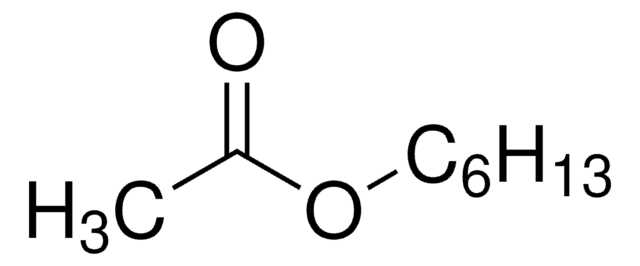W256501
Hexyl acetate
≥98%, FCC, FG
Synonym(s):
Capryl acetate
About This Item
Recommended Products
biological source
synthetic
Quality Level
grade
FG
Fragrance grade
Halal
Kosher
Agency
follows IFRA guidelines
meets purity specifications of JECFA
reg. compliance
EU Regulation 1223/2009
EU Regulation 1334/2008 & 178/2002
FCC
FDA 21 CFR 117
FDA 21 CFR 172.515
Assay
≥98%
refractive index
n20/D 1.409 (lit.)
bp
168-170 °C (lit.)
mp
−80 °C (lit.)
density
0.87 g/mL at 25 °C (lit.)
application(s)
flavors and fragrances
Documentation
see Safety & Documentation for available documents
food allergen
no known allergens
fragrance allergen
no known allergens
Organoleptic
apple; green; fruity; pear; sweet
SMILES string
CCCCCCOC(C)=O
InChI
1S/C8H16O2/c1-3-4-5-6-7-10-8(2)9/h3-7H2,1-2H3
InChI key
AOGQPLXWSUTHQB-UHFFFAOYSA-N
Looking for similar products? Visit Product Comparison Guide
Application
- Bioprospecting of sourdough microbial species from artisan bakeries in the city of Valencia.: Investigating microbial diversity in sourdough, this study identifies hexyl acetate as a key volatile contributing to the unique flavors of artisan bread. The research underscores the importance of microbial bioprospecting in enhancing food flavors and textures (Sanmartín et al., 2024).
- Bioactivities of scent gland chemicals from Mictis fuscipes Hsiao (Hemiptera: Coreidae) on Solenopsis invicta Buren (Hymenoptera: Formicidae).: This study details the defensive chemical strategies of Mictis fuscipes, focusing on hexyl acetate′s role in repelling predators and pests. Such insights are valuable for developing natural pest control methods and understanding ecological interactions (Zhong et al., 2024).
Signal Word
Warning
Hazard Statements
Precautionary Statements
Hazard Classifications
Aquatic Chronic 2 - Flam. Liq. 3
Storage Class Code
3 - Flammable liquids
WGK
WGK 1
Flash Point(F)
132.8 °F - closed cup
Flash Point(C)
56 °C - closed cup
Personal Protective Equipment
Certificates of Analysis (COA)
Search for Certificates of Analysis (COA) by entering the products Lot/Batch Number. Lot and Batch Numbers can be found on a product’s label following the words ‘Lot’ or ‘Batch’.
Already Own This Product?
Find documentation for the products that you have recently purchased in the Document Library.
Our team of scientists has experience in all areas of research including Life Science, Material Science, Chemical Synthesis, Chromatography, Analytical and many others.
Contact Technical Service









